Pshemakho Kotsev: Former President of the North Caucasian Republic
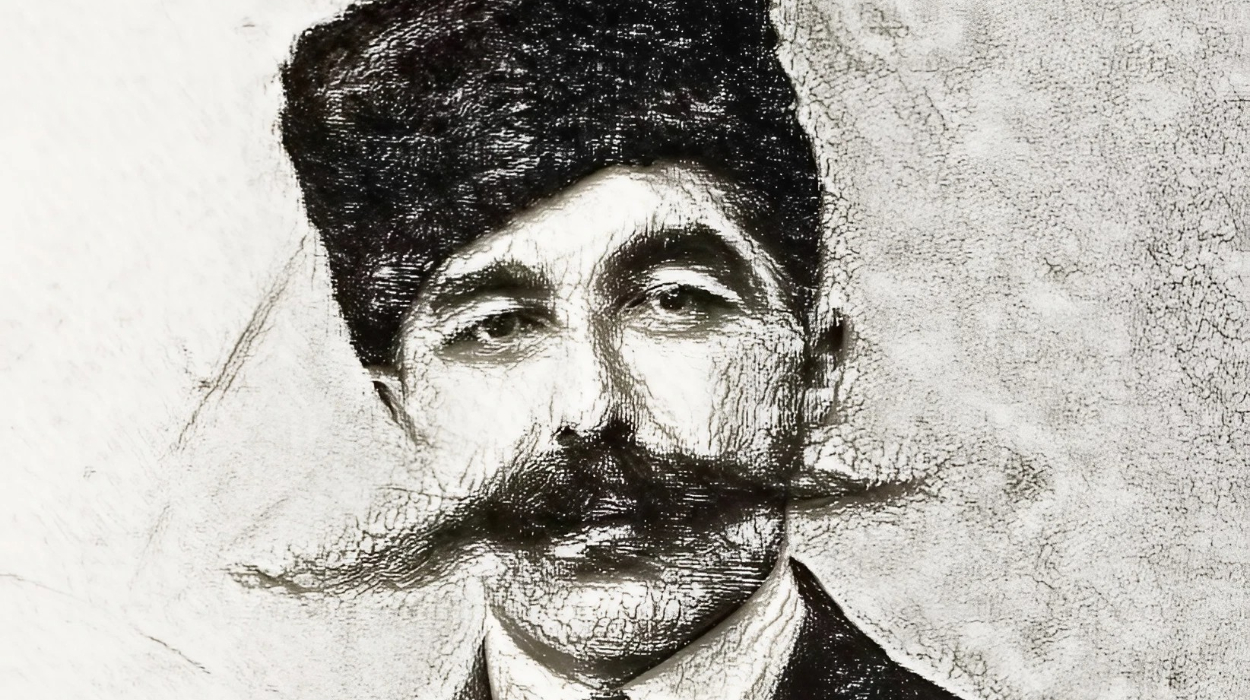
Pshemakho Kotsev was a writer, activist, and the second leader of the Republic of Union of the United Mountaineers of the North Caucasus.
By Amerbi Karmov — The subject of revolution and civil war in the North Caucasus invariably garners heightened interest from a broad readership. This interest stems from the complex situation that emerged in this region, characterised by a multi-ethnic and multi-confessional population and compounded by unresolved land issues in the Terek area. Thus, unlike in central Russia, where civil strife was primarily based on class differentiation—the struggle of the proletariat allied with peasantry against the bourgeoisie—the lines of civil conflict in the Terek initially followed ethnic markers. This confrontation was further intensified by the involvement of various political forces in armed conflict. Soviet regional historiography's oversimplification and glossing over these complexities led to the substitution of the intricate, multidimensional historical narrative of the peoples with a simplistic construct of the "Reds" versus the "Whites". The most selfless individuals, dedicated to serving the people, were pigeonholed under ideological labels like "counter-revolutionary nationalist bourgeoisie", "anti-people social elites", "world bourgeoisie's followers", etc. Among them is Pshemakho Kotsev [in Circassian: Куэцэ Пщымахуэ -Ed.], a figure largely unknown to the general public, except to a small circle of Caucasian historians.
Pshemakho Tamashvich Kotsev was born on 12 April 1884 into the family of Kabardian noble Kotsev Tamash Khustinovich in the village of Babukovo (now Sarmakovo, Zolsky District in Kabardino-Balkaria). Pursuant to his father's wishes, he received his initial education in Pyatigorsk, and later continued at the Novorossiysk Gymnasium, graduating successfully in 1905. In 1910, Pshemakho Kotsev completed his law degree at Saint Petersburg University, receiving a first-class diploma with all rights accorded by the general statute of the Imperial Russian universities.
Pshemakho Kotsev's career as a judicial official in the Novocherkassk Judicial Chamber began on 22 November 1910 in Yekaterinodar (now Krasnodar), starting as a junior judicial candidate. He became an assistant sworn attorney on 27 June 1911, and a sworn attorney of the district from 31 March 1916.
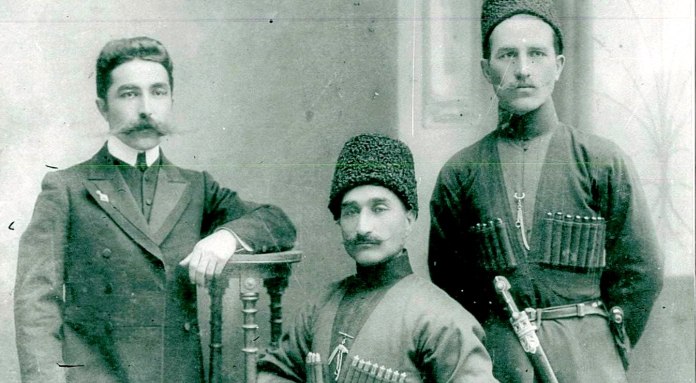
Pshemakho Kotsev (Left).
His active involvement in journalism coincided with his studies in Saint Petersburg and his tenure in Yekaterinodar. While still a law student, Kotsev became a correspondent and avid reader of the "Muslim" magazine, published in Paris by a group of Circassians led by Khadzhetlash (Khadzhetlash, whose real name was Gersh Ettinger, was a Jew from Tiflis. To escape pogroms, he was baptised in Odessa and changed his name to Grigori Ettinger. Later, he joined the Tsar's secret police and began to track down North Caucasian regime dissidents. For this purpose, he spent some time in Istanbul attempting to infiltrate Circassian circles, but was unsuccessful. -Ed.) (Magomet-Bek). During his Petersburg years, he contributed articles on the history of Kabarda under the pseudonym P.Kabardey to various periodicals. His known works from that time, such as "Land Disputes in Kabarda", "Public Education in Kabarda", "Spiritual and Religious Needs of Muslims in the Terek and Kuban Regions", "Circassians and Military Obligations", among others, garnered significant attention.
Pshemakho Kotsev's emergence as a prominent public-political and state figure coincided with the revolution and civil war in the North Caucasus. He returned to Kabarda in late March 1917, was elected to the Nalchik District Civil Executive Committee, actively participated in the I Congress of the Highlanders of the North Caucasus and Dagestan, and became a member of the Central Committee of the Union of United Highlanders. At the Vladikavkaz congress of representatives from across the Terek region (18-20 May 1917), Kotsev was elected chairman of the Terek Regional Civil Executive Committee, the highest authority of the Provisional Government in the North Caucasus.
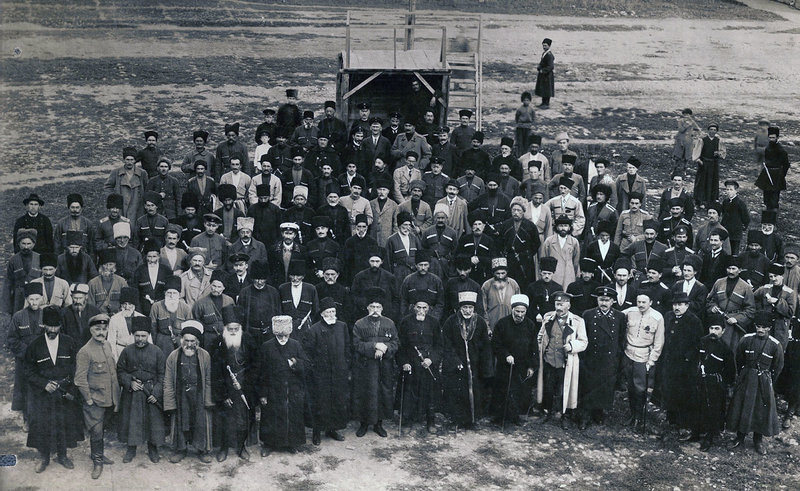
Delegates of the Second Congress of the Union of the Mountaineers of the North Caucasus and Dagestan (1917). In the first row, standing second from the right, is Kotsev.
+ Revolution and Sovietization in the North Caucasus, by Pshemaho Kosok (Kotsev)
+ A speech from the representative of Abkhazia Tumanov at a meeting of the Union Council (Parliament), Mountain Republic
+ Abkhazia, Georgia and the Caucasus Confederation, by Stanislav Lakoba
+ Abkhazia and Georgia on the Verge of Independence (1917 - 1921), by Cem Kumuk
In the escalating socio-economic and political crisis, the Southeast Union of Cossack Troops, Mountaineers of the Caucasus, and Free Peoples of the Steppes was established on 20 October 1917 to ensure political stability in Southeastern Russia. Pshemakho Kotsev joined the joint government, assuming the role of deputy chairman.
Kotsev's public-political and state activities during this period were focused on promoting peace and interethnic harmony in the North Caucasus, aligning with the political programme, platform, and Constitution of the Union of United Highlanders. These were adopted at the Union's I and II congresses, advocating for the establishment of the Russian Democratic Republic on federal principles with extensive local self-governance. Kotsev's nomination as a candidate for the Constituent Assembly by the Kabardian, Balkar peoples, and the Russian populace of the Nalchik district attested to his esteemed reputation. However, the ascendancy of Soviet power in October 1917 necessitated a shift in the Union's political priorities, leading to the formation of the Mountain Government from the Central Committee members in November 1917.
The establishment of Soviet authority in the Terek in spring 1918 spurred the Union leaders into decisive action. On 11 May 1918, at the Batumi Conference, the Mountain Government delegation led by A.-M. (Tapa) Chermoev proclaimed the independence of the Mountain(ous) (North Caucasian) Republic, with Chermoev as its chairman and Kotsev as Minister of the Interior.
Following a request from the Mountain Government, a military unit led by the Circassian Yusuf Izzet-Pasha arrived in Derbent on 4 October 1918. However, the signing of the Armistice of Mudros on 30 November 1918 compelled Turkey to withdraw its troops from Transcaucasia, Iran, and Cilicia, leading to the arrival of British forces in the Caucasus.
In late November 1918, Kotsev was summoned by the British command to negotiations in Baku, commencing on 26 November. The outcome was the recognition of the Mountain Republic's independence pending the final resolution of the Caucasian issue at the Paris Peace Conference. Kotsev was then tasked with forming a new coalition government.
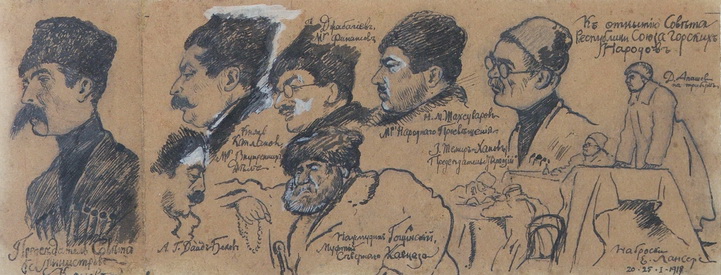
"Council of the Republic of the Union of Mountain Peoples" (January 20-25, 1919) Drawing by Eugene Lanceray (1875 - 1946). Pshemakho Kotsev (Kabardian), Adil-Girey Daidbekov (Kumyk), Prince Rashidhan Kaplanov (Kumyk), Vassan-Girey Dzhabagiev (Ingush), Nazhmuddin Gotsinsky (Avar), Nur-Magomed Shahsuvarov (Azerbaijani) Zubair Temir Khanov (Kumyk) Daniyal Apashev (Kumyk).
The first session of the Union Council (Parliament) of the Mountain Republic was convened on 20 January 1919 in Temir-Khan-Shura (Buynaksk). Kotsev, as the government chairman, delivered an address. However, the entry of the Volunteer Army into the Mountain Republic drastically altered the political landscape in the North Caucasus and Dagestan. Denikin declared the Mountain Republic hostile and illegitimate, a stance supported by the British military mission in Transcaucasia. Following fruitless negotiations with the Volunteer Army command, Kotsev's government appealed to the Paris Peace Conference (1919-1920), decrying Denikin's army's hostile actions, but to no avail. This led to Kotsev's government's resignation on 22 March 1919, though he was re-elected by Parliament to form a new government.
Kotsev's second government faced even more challenging circumstances. With the increasing pressure and southward advance of the Volunteer Army, popular dissatisfaction with the government's policies grew, and fierce political infighting ensued. By then, a substantial anti-government, pro-Denikin force had emerged in Parliament. Moreover, the Bolsheviks, openly distributing money, were assembling a Red squad. Witnessing this, Kotsev's government collectively resigned. Although offered to form a new government, Kotsev categorically refused and departed for Tiflis, where on 2 September 1919, he played a key role in establishing the Union Majlis of the Mountain Peoples of the Caucasus, a focal point for anti-Bolshevik and anti-Denikin forces.
In March 1920, Kotsev emigrated to Turkey, collaborating with various anti-Bolshevik emigrant committees. Importantly, during World War II, Kotsev maintained his honour and dignity, avoiding collaboration with the German-fascist occupiers. His prolific period included works like "Revolution and Sovietization in the North Caucasus" and "The North Caucasus: Pages from the History of the Struggle for Freedom and Independence".
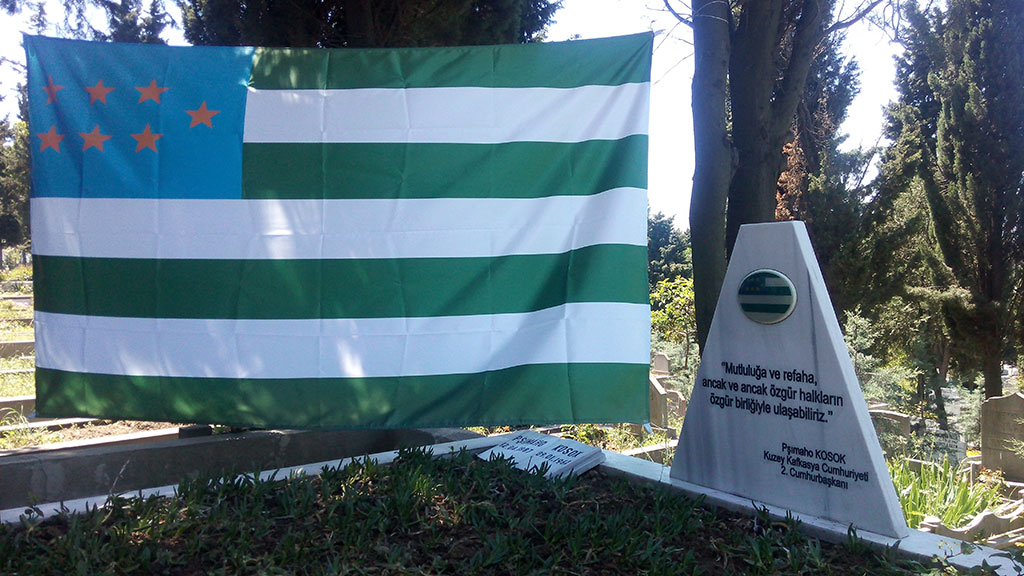
P.T. Kotsev passed away on 8 January 1962, aged 78, in Istanbul. He was interred as a high-ranking state official. His tombstone in Turkish reads: "Former President of the North Caucasian Republic".
This article, written by Amerbi Karmov, a Candidate of Historical Sciences, was first published in the "Kabardino-Balkar Pravda" newspaper and has been translated from Russian.